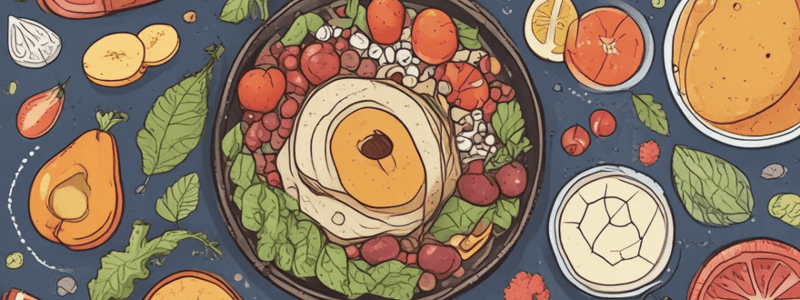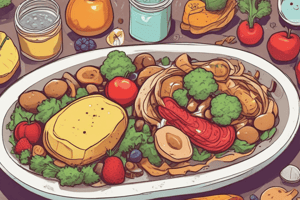Podcast
Questions and Answers
What percentage of total energy from carbohydrates is recommended in a nutritionally adequate diet?
What percentage of total energy from carbohydrates is recommended in a nutritionally adequate diet?
- 65-85%
- 35-45%
- 55-75%
- 45-65% (correct)
What is the primary source of energy in the diets of millions of people in developing nations?
What is the primary source of energy in the diets of millions of people in developing nations?
- Protein
- Complex carbohydrates (correct)
- Refined starches
- Added sugars
What is the approximate percentage of calories from carbohydrates in the typical diet of adult Americans?
What is the approximate percentage of calories from carbohydrates in the typical diet of adult Americans?
- 46% (correct)
- 50%
- 40%
- 55%
What is the term for sugars added to foods during processing?
What is the term for sugars added to foods during processing?
What is the main source of energy in the diets of people in industrialized nations?
What is the main source of energy in the diets of people in industrialized nations?
What are added sugars sources of?
What are added sugars sources of?
What is the name of the report that provides data on nutrient intakes from food and beverages?
What is the name of the report that provides data on nutrient intakes from food and beverages?
In what year was the data for the average macronutrient intakes collected?
In what year was the data for the average macronutrient intakes collected?
What percentage of the energy in a 2000 kcal/day diet comes from added sugars, according to the average American consumption in 2017?
What percentage of the energy in a 2000 kcal/day diet comes from added sugars, according to the average American consumption in 2017?
How many teaspoons of added sugars should people who follow a 2000 kcal/day diet limit their intake to per day?
How many teaspoons of added sugars should people who follow a 2000 kcal/day diet limit their intake to per day?
What is the approximate amount of added sugar in a 12-ounce can of a cola-flavored, sugar-sweetened soft drink?
What is the approximate amount of added sugar in a 12-ounce can of a cola-flavored, sugar-sweetened soft drink?
Why should you not drink regular soft drinks instead of fruit juices?
Why should you not drink regular soft drinks instead of fruit juices?
What are the main sources of added sugars in Americans' diets?
What are the main sources of added sugars in Americans' diets?
What should you replace soft drinks with to make a healthier choice?
What should you replace soft drinks with to make a healthier choice?
Why should you choose 100% fruit juice over fruit 'ades' or 'punches'?
Why should you choose 100% fruit juice over fruit 'ades' or 'punches'?
What can you do to increase your intake of healthy carbohydrates?
What can you do to increase your intake of healthy carbohydrates?
Why should you not frequently purchase foods and beverages from vending machines, convenience stores, or fast-food restaurants?
Why should you not frequently purchase foods and beverages from vending machines, convenience stores, or fast-food restaurants?
What is a healthy snack option?
What is a healthy snack option?
Flashcards are hidden until you start studying
Study Notes
Carbohydrate Consumption Patterns
- In developing nations, people rely on diets that supply the majority of their energy from relatively unprocessed carbohydrates, especially complex carbohydrates from whole grains, beans, potatoes, corn, and other starchy vegetables.
- In industrialized nations, people tend to eat more highly refined starches and added sugars.
- Nutritionally adequate diets should provide 45 to 65% of total energy from carbohydrates.
- The typical diet of adult Americans supplies about 46% of calories from carbohydrates, much of which is sugars added to foods during processing.
Added Sugars
- Added sugars are sources of empty calories.
- The average American consumed about 22 teaspoons of added sugars per day, which is almost 18% of the energy in a diet that supplies 2000 kcal/day.
- The Dietary Guidelines recommend limiting intake of added sugars to no more than 12 teaspoons per day (about 200 kcal) for a 2000 kcal/day diet.
- A 12-ounce can of a cola-flavored, sugar-sweetened soft drink contains about 37 g of added sugar, contributing 150 kcal of added sugars to the diet.
Sources of Added Sugars
- The main sources of added sugars in Americans’ diets are sugar-sweetened beverages, snacks, and “sweets.”
- Sugar-sweetened beverages include carbonated “regular” soft drinks, fruit “ades,” flavored vitamin-water products, and sports and energy drinks.
Reducing Added Sugar Consumption
- Replace soft drinks with plain water.
- Make plain water more interesting to drink by adding a slice of lemon or lime, or a few fresh or frozen berries.
- Add 1 part club soda to 1 part orange or other 100% fruit juice to make a refreshing carbonated drink.
- Read the label for information about juice content when selecting a fruit juice product.
Increasing Healthy Carbohydrates
- Limit or avoid foods and beverages high in refined starches and added sugars, such as sugar-sweetened beverages, cookies, chips, and processed snack foods.
- Choose whole fresh fruit or small containers filled with chunks of fresh fruit and pieces of vegetables as portable snacks.
- Keep a bowl of fresh grapes, apples, bananas, or other easy-to-eat fruit available for handy snacks.
- Eat fresh fruit for dessert, which contains a variety of antioxidants, and has less fat and more fiber, vitamins, and minerals than pastries or chips.
Studying That Suits You
Use AI to generate personalized quizzes and flashcards to suit your learning preferences.




